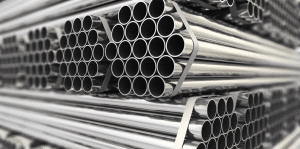
Stainless steel piping has become the norm in industrial settings. The strength inherent in stainless steel, along with its corrosion resistance, makes it the ideal material for pipes that carry chemicals or gasses. Stainless steel is used widely for both indoors and outdoor applications because of its versatility and offers a number of advantages over other substances used in piping. When looking into stainless steel pipe suppliers, it’s important to understand what aspects of piping will best suit your needs.
Why Use Stainless Steel Pipes
Pipes can be made from a variety of different substances, but stainless steel offers a number of advantages over those made from other substances. When compared to plastic or silicon piping, stainless steel pipes can withstand higher temperatures and more easily be cleaned. Though copper and aluminum have also been used to make pipes, stainless steel provides better protection than the former and greater strength than the latter.
- Several other advantages that stainless steel pipes provide:
- Allows for higher flow rates
- Can easily shape, plane or otherwise machine
- Durable
- Lightweight
- Recyclable
- Requires little maintenance
- Resistant to scratches and corrosion
Stainless steel pipes are normally made from 300 series stainless steel, which contains between 18-30% chromium and 6-20% nickel. These alloys help stainless steel piping not only resist corrosion but also maintain its strength at higher temperatures.
Varieties of stainless steel in the 300 series are made hard through cold-working methods, which allow for easier shaping, manufacturing, and control of surface quality. Since it requires no heating, it also makes the process more economical than manufacturing other metals into piping.
This type of stainless steel is also known as austenitic steel, which means it’s composed of iron, carbon, chromium, nickel, and modest amounts of other metals. These austenitic alloys are best known for resisting corrosion, which is why they account for over 70% of steel production.
The most commonly used stainless steel grade for piping is type 304 and is widely used in both the construction and food processing industries. Type 316 also offers similar resistance to corrosion, though it proves better at withstanding corrosion from solvents and chemicals. As it offers better resistance to chloride corrosion, it’s preferred for marine or outdoor applications, as well as for various industrial and medical uses. Pipes from stainless steel grade 317 are even more resistant to pitting in corrosive environments.
Quality varies between these different gradings. Sometimes the benefits of certain alloys will outweigh the costs. Asking stainless steel pipe suppliers about the specific environment in which the piping will be installed will help in making decisions to best suit your needs.
Common Applications of Stainless Steel Piping
When it comes to stainless steel piping, the purpose for which it is being used will help determine the type of stainless steel needed. Stainless steel pipe suppliers can assist in this regard, pointing customers towards the type that best suits their needs. Pipes also vary in size and design.
Pipe Sizes and Shapes
Used for infrastructure and in a variety of manufacturing plants, steel pipes are the most used product produced by the steel industry and come in the following shapes to fit specific purposes:
- Hollow stainless steel pipes – Help to reduce waste and the need for machining; they are used in industries that include textile, paper, and food processing.
- Oval stainless steel piping – Used for heat transfer equipment like boilers, often for the manufacturing of pharmaceuticals or chemicals. Its material strength and durability make them a preferred choice for customers.
- Rectangular stainless steel pipes – Used when strength matters, along with resistance to corrosion and can substitute for sheets or plates. They can be hot rolled – a process where the steel crystallized at temperatures over 1000 degrees Fahrenheit – or cold drawn, where it’s shaped at room temperature.
- Round stainless steel pipes – Easy to sterilize, clean, weld and machine. Resistant to corrosion, they contribute to both structural functionality and aesthetics.
- Square stainless steel pipes – Have similar properties to rectangular pipes, and are used for engineering and structural purposes.
Industry Applications
Though primarily used to transport liquid or gas fuels, stainless steel piping is also used for:
- Fire sprinkler system piping, due to its ability to resist corrosion, cost and hydraulic properties.
- Condensation lines in boilers, as stainless steel piping handles high temperatures and pressures well.
- Petroleum and natural gas transportation, including from offshore platforms where stainless steel resists the harsh environment that quickly corrodes other material.
- Piping in food processing plants, as it’s safe to use to transport food and beverages.
- Wastewater treatment because of its characteristic strength, corrosive resistance and ability to handle pressure.
- Water pipes capable of carrying both hot and cold water.
- Stainless steel pipes are used widely in manufacturing or construction. Narrow stainless steel piping helps run refrigerator cooling systems. It is used for heating and plumbing, or even for constructing handrails, pipe bollards for utility poles and even bike racks.
Comparing Stainless Steel Pipe Suppliers
Not all stainless steel pipe suppliers are created equal. Before ordering, research the supplier to ensure you aren’t getting substandard material. Just like in any industry, there are upstarts who will cut corners in order to offer lower prices than their competitors. This will often be at the expense of quality, which in many industries will cause safety issues.
Make sure your supplier is licensed and that its staff has plenty of experience in the industry. Experienced sales staff with adequate technical knowledge can help determine the best type of stainless steel pipe for your needs.
At Atlantic Stainless, we are full-service stainless steel suppliers and distributors. Our experienced team offers over 150 years of combined experience across industries and work with millions of pounds of inventory, so you can rest assured that we have what you need. Contact us today!

